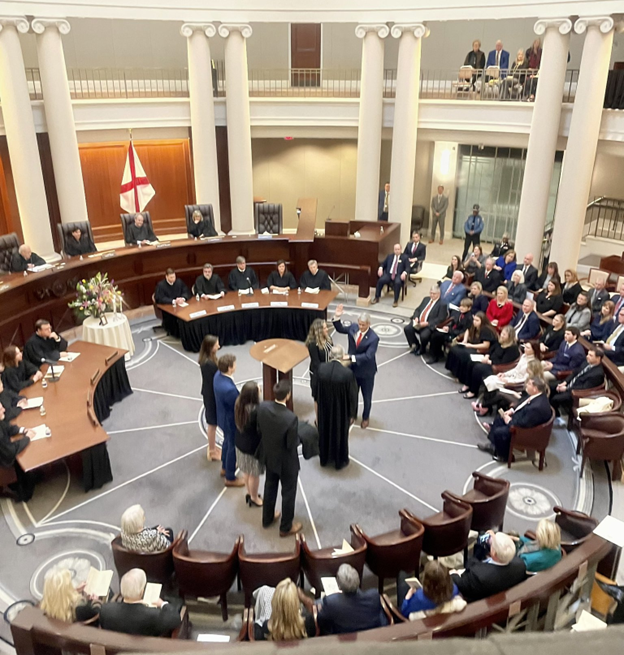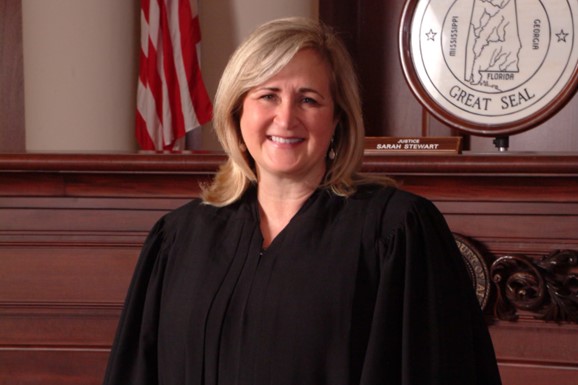Judge dismisses appeal by Alabama ex-sheriff Mike Blakely to have theft and ethics conviction overturned

Former Limestone County Sheriff Mike Blakely has lost his latest appeal to have his theft and ethics conviction and jail sentence overturned. Circuit Judge Tim Jolley dismissed Blakely’s post-trial appeal on Saturday. Blakely argued the retired judge, who was appointed to preside over his trial, was not qualified because her membership had lapsed with the Alabama Bar Association. Jolley ruled that her appointment was proper. A jury in 2021 found the longtime sheriff guilty of charges of theft and using his office for personal gain. After nearly 40 years in office, Blakely was removed from his position as sheriff following the conviction. The two convictions arose from accusations that Blakely helped himself to no-interest loans from a jail safe used to hold inmates’ money and that he deposited $4,000 in campaign funds into his personal account. Blakely was sentenced to serve three years behind bars. Alabama Supreme Court Chief Justice Tom Parker appointed former Alabama Court of Criminal Appeals Judge Pamela Baschab to preside over Blakely’s case after other judges had recused themselves. Jolley, in rejecting Blakely’s appeal, said nothing in state law or the Alabama Constitution requires the appointment of retired judges with an active law license. He also said Blakely could have raised the issue at trial but did not do so. “Because neither requires a retired judge— not least one with more than thirty years of unblemished service— to maintain an active license to practice law, Judge Baschab’s appointment was lawful and proper,” Jolley wrote in the Saturday order. The Alabama Supreme Court in February declined to hear an earlier appeal by Blakely. Republished with the permission of The Associated Press.
Senate passes legislation to create new judgeships

On Thursday, the Alabama Senate passed legislation creating four additional circuit judgeships and three additional district judges. Senate Bill 39 (SB39) is sponsored by Sen. Sam Givhan (R-Huntsville). The legislation creates four new circuit judgeships in the 23rd Circuit (Madison County), the 28th (Baldwin County), the 19th (Autauga, Chilton, and Elmore counties), and the 37th (Lee) as well as three additional district judgeships in Baldwin, Mobile, and DeKalb counties. Alabama has grown over the years in population, but the number of circuit and district judges in Alabama has not increased at the same pace. This means higher case dockets for most of the judges the state has, which translates into divorces, civil litigation, and even criminal trials being postponed as overworked courts cannot expedite trials, hearings, and other work. Chief Justice Tom Parker told a reporter two years ago that the state needed 21 more judges. The Legislature addressed this in 2015 when they passed a plan to reallocate judgeships. The plan was to reallocate judgeships to growing areas of the state, like Shelby County, Madison County, and Baldwin County, from declining or stagnant areas of the state, like Montgomery County, Jefferson County, and the Black Belt. When a judgeship was vacated due to death, retirement, or removal from the bench the Reallocation Commission was to have ordered that vacant judgeship reallocated from where the need was lesser to where it was greater. That was not popular with the judges and has not happened with great regularity. At the assistance of Senator Rodger Smitherman (D-Birmingham) and the Alabama Judges Association, SB39 would put a moratorium on the reallocation of judges until 2027. The new judgeships would be filled by elections in 2024, with the new judges going into office in the second week of January 2025. This means that the fiscal year 2024 state general fund budget (SGF) that passed the House three weeks ago, which included no additional money for judges, will not need to be amended heavily if SB39 becomes law. According to the fiscal note, passage of SB39 will cost the state $2.1 million in 2025 and at least $2.9 million a year beyond that. The effect on the SGF will be $1.9 million in FY2025 and $2.5 million in FY2026 and beyond. An earlier version of the bill created a new circuit judge in the eleventh circuit (Lauderdale County) instead of the thirty-seventh (Lee County). The substitute version that passed the Senate on Thursday eliminates that new circuit judgeship and moves that circuit judgeship to the thirty-seventh – though that change does not appear in the fiscal note. The new circuit in the 19th circuit may reside in any county within the Nineteenth Judicial Circuit (Chilton, Autauga, or Elmore counties). The judge occupying Judgeship Number 4 shall be assigned to the domestic relations division of the circuit. The initial judges elected to the additional judgeships created by SB39 shall serve for a six-year term, holding office from the first Monday following the second Tuesday in January after the general election at which the judges are elected. SB29 also orders the Administrative Office of Courts to provide the following statistics for each fiscal year by circuit: (1) Number of civil cases filed broken down by category. (2) Number of civil cases resolved via a motion to dismiss or voluntary dismissal. (3) Number of civil cases resolved via a motion for summary judgment. (4) Number of civil cases in which a jury is empaneled. (5) Number of civil cases tried to a jury verdict. (6) Number of criminal cases filed broken down by type of offense. (7) Number of total criminal counts filed broken down by type of offense. (8) Number of criminal cases resolved via dismissal. (9) Number of criminal cases resolved via plea agreement. (10) Number of criminal cases resolved via some form of pre-trial diversion or alternative resolution program. (11) Number of criminal cases in which a jury is empaneled. (12) Number of criminal cases tried to a jury verdict. (13) Number of juvenile cases filed broken down by dependency and delinquency. (14) Number of juvenile cases resolved. (15) Number of domestic cases filed broken down by category. (16) Number of domestic cases resolved. (17) Number of probate cases appealed to the circuit court. (18) Any other information or data deemed relevant by the Alabama Supreme Court. That information shall be provided to all of the following by January 15 of each year: (1) The Speaker of the House of Representatives. (2) The President Pro Tempore of the Senate. (3) The chair of the Senate Finance and Taxation, General Fund Committee. (4) The chair of the House Ways and Means General Fund Committee. (5) The chair of the Senate Judiciary Committee. (6) The chair of the House Judiciary Committee. (7) The Legislative Fiscal Officer. (8) The chair of the Legislative Council. (9) The vice chair of the Legislative Council. (10) The Senate Minority Leader. (11) The House Minority Leader. The bill, as substituted, passed the Alabama Senate in a vote of 33 to 0. It moves to the Alabama House of Representatives for their consideration. Speaker of the House Nathaniel Ledbetter (R-Rainsville) previously told Alabama Today that he and the House were in favor of legislation addressing the state’s judge shortage. Thursday will be day 21 of the 2023 Alabama Regular Legislative Session. The House convenes at 1:00 p.m. To connect with the author of this story or to comment, email brandonmreporter@gmail.com.
Legislature could address judge shortage this year Speaker Nathaniel Ledbetter says

The Alabama House of Representatives passed the largest state general fund budget (SGF) in state history on Tuesday. The over three billion SGF has nearly doubled since 2015 when legislators had to raid the state’s savings account – the Alabama Trust Fund – to keep Medicaid afloat and most non-education state agencies operable. Mental Health was cut dramatically in that period, as was maintenance on Alabama’s aging prison infrastructure. Both of those decisions have come with consequences moving forward. One area where those post-Great Recession general fund woes have had an enormous impact is on judges. The state’s population is now over five million. The state’s population has grown by over a million people since 1990, and the number of judges on the bench has not kept up. That growth has not been evenly distributed, however. Thirty-five years ago, Huntsville was a farming community with a military base and a NASA site. Today it is the largest city in the state. Baldwin County has boomed. Elmore, Shelby, Lee, Limestone, St. Clair, Autauga, and Dekalb Counties have all grown in that period at a faster rate than the state as a whole. Subdivisions now stand where cows once grazed. In 2015 judges, especially in those fast-growing counties, struggled with large caseloads. The judiciary needed more judges then, but the general fund had seen revenues decline by over 20% since 2008, so there was no money to give to the court system. The Legislature responded to those concerns by passing reallocation. The Courts were ordered that when a judge retires in an area like the Black Belt, Jefferson County, Montgomery County, or West Alabama, that judgeship would be abolished and reallocated to a growing area like Baldwin or Madison County. “That has not happened,” Speaker of the House Nathaniel Ledbetter told reporters on Tuesday. “Reallocation has not worked.” “There have been two or three vacancies that should not have been filled,” Ledbetter said. “My County (Dekalb) is 2.7 judges short,” Ledbetter said. “In 2015, we passed reallocation, and we were two judges short. Now we are almost three.” Chief Justice Tom Parker said in 2021 that the Judiciary system had done a study that showed that the state need 21 additional judges. While the general fund budget that passed out of the House on Tuesday had no funding for additional judges, House budget chair Rex Reynolds acknowledged that the state has an issue with growing case dockets and is working on the issue. “I am going to meet with the judges tomorrow,” Reynolds said. “There has to be something done,” Ledbetter said. “There is an appetite to fix it.” Reynolds said three bills have been introduced, including one by Sen. Sam Givhan, to address the judge shortage issue. “I am going to show them (the judges) the three bills and ask them which they like,” Reynolds said. “It is something we have got to look at,” Reynolds said. The state general fund budget passed on Tuesday includes a two percent pay raise for state employees and considerable increases in money for prisons and mental health. “I was excited to see it pass today,” Ledbetter said. “Chairman Reynolds and that committee has worked really hard.” Ledbetter acknowledged that even though the general fund is larger than ever,” It is hard to spread the money out and make everything happen.” The budget, including a sizable supplemental appropriation for this year, now goes to the Senate Finance and Taxation General Fund Committee – chaired by Sen. Greg Albritton. “Sen Albritton and he (Reynolds) have been working together since summer,” Ledbetter said. Reynolds said that if the Senate makes major changes to the budget, he will ask that the House non-concur. Ledbetter said that that would not be surprising. “Most of the time, the General fund and education budget go to conference committee,” Ledbetter explained. “Alabamians can be proud,” of the improvement in state budgets over the last several years, Ledbetter said. “When I first came in (2015), we could hardly pay the light bill.” Ledbetter predicted that the education budget will be out of committee in the Senate next week. “We will have it in the Senate next week,” Garrett said. “If not, then the following. Chairman (Danny) Garrett thinks it will be next week.” Ledbetter is the former Mayor of Rainsville. Alabama has an arcane budgeting system where over 90 percent of the money is earmarked. There are two separate budgets and billions of dollars outside of the two budgets making moving funds from where there is excess revenue to the greatest need difficult and sometimes constitutionally impossible. Thursday will be day 15 of the 2023 Alabama Regular Session. To connect with the author of this story or to comment, email brandonmreporter@gmail.com.
Ron Desantis speaks to Alabama Republicans

Florida Governor Ron Desantis was in Hoover on Thursday to address the Alabama Republican Party. Over 1,400 attended the GOP’s winter dinner fundraiser to hear the likely presidential candidate denounce the “woke” movement. Desantis was welcomed by Alabama Gov. Kay Ivey, who introduced DeSantis, as well as other top state elected leaders. Attorney General Steve Marshall, Lieutenant Governor Will Ainsworth, Secretary of State Wes Allen, State Auditor Andrew Sorrell, Commissioner of Agriculture and Industries Commissioner Rick Pate, Chief Justice Tom Parker, Senate President Pro Tem Greg Reed, Speaker of the House Nathaniel Ledbetter, and many more were on hand at the Finley Center to welcome DeSantis to Alabama. “Tonight, I was proud to welcome @GovRonDeSantis to our Sweet Home Alabama!” Gov. Ivey said on Twitter. “I was honored to welcome “America’s Governor” @GovRonDeSantis to Alabama and lead the ALGOP dinner in the Pledge of Allegiance,” Lieutenant Gov. Ainsworth said on Twitter. Gov. DeSantis’s speech was heavy on social conservatism. DeSantis spoke about his feud with Disney, his opposition to books that preach alternate sexual lifestyles to children even in elementary school being in school libraries, his opposition to the COVID-19 economic shutdowns mask mandates, his anti-riot measures in Florida following the George Floyd riots, his shipping illegal aliens to Martha’s Vineyard, his opposition to the transgender agenda, and the migration of people from blue states like New York, Michigan, and California to red states like Florida. DeSantis said that Hispanics in Florida support his efforts to reduce illegal immigration to Florida. He also compared and contrasted his state of Florida with the state of New York. They have similar populations, but New York has twice the state budget. “What do they get for all that money?” DeSantis said. “We have no state income tax. Alabama should try that,” DeSantis said. While Florida has no income tax, their property taxes are far higher than Alabama’s, and as anyone who has driven around Florida knows, there are toll roads and toll collections all over the state outside of the federal interstate system, which are very rare in Alabama. Florida residents, on average, have a 9.1% state and local tax burden (#11 in the country), while Alabama residents pay 9.8% (#20 in the country.) Tennessee has the lowest tax burden in the southeast at 7.6% (#3 in the country). DeSantis spoke about his hurricane response and how fast his team built back a bridge to connect the residents of an island to the mainland. Desantis said that if he was President, his team could get the border wall built quickly and at reduced cost. DeSantis has not yet announced his presidential campaign. At this point, the only announced presidential candidates are former President Donald Trump and former South Carolina Governor and U.N. ambassador Nikki Haley. DeSantis and President Joe Biden are, at this point, presumed to be presidential candidates. DeSantis’s speech was the speech of a governor, touting his accomplishments as a governor. The most pressing issues facing the next President are Russia’s invasion of Ukraine, balancing the federal budget without crashing the economy, the possibility of war with China, the high likelihood of Iran obtaining nuclear weapons, the prospect of that triggering a war in the Middle East, as well as energy policy and its perceived connection to climate change. Desantis will have to discuss these larger issues in a presidential campaign. The Alabama Republican presidential primary is scheduled for March 5, 2024. To connect with the author of this story or to comment, email brandonmreporter@gmail.com.
Steve Flowers: Five seats on the Alabama Supreme Court up for election in 2024

Next year is a big year nationally. It is a Presidential year. However, it is a down or off year for Alabama. We, like several other southern states, have our big election year in non-presidential years. We elected our governor, other constitutional offices, and our entire legislature last year in 2022. However, since we have staggered six-year terms for our state judges, we have an inordinate number of seats on our Supreme Court up for election next year. We have nine members of our State Supreme Court. All nine are Republicans. Even though our Supreme Court is elected, we have a surprisingly wise and very qualified state high tribunal. All nine are well-qualified and well-rounded, yet very Republican and very conservative. We are a very Republican and very conservative state. Therefore, these nine judges are reflective of the Heart of Dixie. Even though there are five seats up for election, there is only one opening. Chief Justice Tom Parker is precluded from running for a six-year term. He is 72, and our state laws mandate that someone cannot run for a judgeship after they reach the age of 70. Popular and younger jurists hold the other four seats. Three of the four will seek reelection and will win easily even if they draw opposition. These three incumbents are Will Sellers, Jay Mitchell, and Tommy Bryan. The fourth, Sarah Stewart, is opting to run for the Chief Justice post Tom Parker is vacating. Justice Will Sellers probably will not draw an opponent. He is perfectly suited for the State Supreme Court. His resume reads as though he was born for the job. He was a successful tax attorney in his hometown of Montgomery. He graduated from the University of Alabama Law School and has a Master of Law Degree in Taxation from New York University. His Tax Law expertise is invaluable to his colleagues on the Court. Will has a keen political mind in addition to his legal prowess. He and his wife, Lee Grant Sellers, are Governor Kay Ivey’s closest confidants. Will has sworn Governor Ivey into office at both her Inaugurations. Justice Sellers also pens a monthly column on historical events. Justice Tommy Bryan is up for another six-year term. This popular incumbent jurist will be reelected without opposition. He hails from rural South Alabama – Brantley in Crenshaw County, to be exact. He was first elected in 2012 and reelected to a second six-year term in 2018. Therefore, he will be seeking his third six-year term in 2024. He previously served eight years on the Court of Civil Appeals. He and his lovely wife Pam have two adult children. Tommy and Pam are very active members of the First Baptist Church of Montgomery. Judge Jay Mitchell is the tallest member of the Supreme Court. He stands a good 6 feet 8 inches. He also stands tall with integrity and wit. He is an affable fellow and is finishing his first six-year term on the high court. He will easily win election to his second term, probably unopposed. He graduated from Birmingham Southern College, where he starred in basketball. He graduated from the University of Virginia Law School. He and his wife, Elizabeth, reside in Homewood with their four children. Jay Mitchell is only 46. He is not only the tallest member of the Court but also the youngest. Justice Sarah Stewart is opting to leave her safe seat as an associate justice to seek election as Chief Justice next year. She has already announced and is actively running. More times than not, the early bird gets the worm. Justice Stewart served 13 years as a Mobile Circuit Court Judge prior to going on to the Supreme Court. Judge Chris McCool, an associate justice on the Alabama Court of Criminal Appeals, is favored to win Justice Stewart’s seat. You can bet your bottom dollar he will not be outworked. Even though there are five seats up for reelection on the high court, there will be very little change when the dust settles. This is a good court, and they have an excellent collegial working relationship. The 2024 elections have begun. See you next week. Steve Flowers is Alabama’s leading political columnist. His weekly column appears in over 60 Alabama newspapers. He served 16 years in the state legislature. Steve may be reached at: www.steveflowers.us.
Personnel Update: Stephanie Smith is the new President and CEO of the Alabama Policy Institute

The Alabama Policy Institute (API) announced in a statement that it has named Stephanie Smith as API’s third president and CEO. She will succeed Caleb Crosby, who is stepping down as President and CEO. Smith has been a consistent conservative political voice in Alabama since 1998. Her professional experience includes serving as Director of Governmental Affairs for Regions Financial, President of the Opelika Chamber of Commerce, Assistant Director of Finance for the State of Alabama, Deputy Director of Finance for the State of Alabama, and Principal of the Thatcher Coalition. “I am honored by the confidence of API’s leadership and look forward to building upon the successes of the organization by actively engaging elected officials and other Alabamians in substantive public policy conversations,” Smith said. The mission and vision of API are sound, and it is my privilege to have the opportunity to champion conservative principles statewide.” “Stephanie has been working alongside the API team since 2021,” said API Board Chairman Richard Stimpson. She brings a wealth of political knowledge and decades of practical policy experience to the team. Stephanie is a stalwart for the principles upon which API was founded: free markets, limited government, and strong families.” Tom Bradford is the founding board chairman and former API Interim President and CEO. “It’s clear that Stephanie is the right person to serve as the next President and CEO of API,” Bradford said. “She is grounded in her faith and articulates the positions of the conservative movement with precision and passion.” Smith is married to Dalton Smith and is the mother of seven. Stephanie is a cum laude graduate of Auburn University and a cum laude graduate of the University of Alabama at Birmingham with a Master’s Degree in Public Administration. While attending graduate school at UAB, Stephanie created and managed Region’s grassroots platform. She also has lobbied in nine states and DC. Smith was an advisor and legislative manager for the Governor regarding budgetary issues and was the lead economic development and public finance coordinator for the State. She is the 6th Congressional District Chairman for the Alabama Republican Party, is a Board Member of Eagle Forum of Alabama, and is a member of the Republican Women of North Shelby County and the Shelby County Republican Party. She is also a contributor at the 1819 News. As a former lobbyist, Smith brings a great understanding of legislative affairs and how both Montgomery and Washington actually work. This experience could be helpful going forward as API works towards promoting its ideas into actual legislation. The Alabama Policy Institute was founded 34 years ago as a conservative think tank associated with Focus on the Family by Tom Parker and Gary Palmer. Since then, it has advocated for smaller government and free market principles. Palmer led API as President and CEO for many years, establishing a nationwide following with allied think tanks in almost every state. Palmer left API in 2014 to run for Congress. Today he is serving in his fifth term representing Alabama’s Sixth Congressional District. Crosby succeeded Palmer in August 2014. While Crosby was President and CEO, API became more involved in communications – spinning off 1819 News and Rightside Radio – in an attempt to more actively communicate the values and principles of conservatism through a statewide multi-media strategy. API also created the Alabama Center for Law and Liberty (ACLL) to play a more active role in the judicial system. “It has been an honor to lead API in its ongoing pursuit to be the premier resource for conservative policy ideas in the state,” Crosby said. “Building upon the accomplishments of the past, API and its subsidiaries have asserted themselves as the authority and voice of conservative principles for the State of Alabama.” “Caleb has been an incredibly innovative leader for API. His years of service have benefitted API, and the legacy of his work will benefit the entire state,” Stimpson said. To connect with the author of this story, or to comment, email brandonmreporter@gmail.com.
Greg Cook joins the Alabama Supreme Court

The Alabama Supreme Court held an Investiture and Oath of Office ceremony on Friday to welcome newly-elected Justice Greg Cook and re-elected Justice Kelli Wise. The Justices took their oaths of office in the Supreme Court Courtroom. “Yesterday was my investiture for the Alabama Supreme Court,” Cook said on Facebook. “I was overwhelmed by the many, many people who attended, for the thousands and thousands who supported me, and by the responsibility of this office. The Church service beforehand was so powerful and I am so thankful for St. John’s Episcopal and Donna Johnson and my pastor David Eldridge. I admit that I cried. I know that I owe God the glory for this opportunity. I am also so thankful to the many, many people at the Supreme Court (and Allison Skinner) who made the investiture so special. A special thanks to Justice Champ Lyons for swearing me in and to Attorney General Steve Marshall for presenting my commission. I have so much to be thankful.” Justice Cook was elected in November 2022 to fill the seat of Justice Michael F. Bolin, who retired last week after 18 years of service on the Supreme Court. Justice Wise was re-elected to her third term, having served on the Court since 2010. Chief Justice Tom Parker presided over the investiture ceremony. “We welcome our new colleague Justice Greg Cook to our Court, and we welcome back Justice Wise,” Parker said. “We thank them both for their past service in the legal and judicial community, and confidently pray and believe that their future service will honor the Lord, the law, and the trust that the people of Alabama have placed in them.” “I wish Mike all the best in his retirement from the bench, although I expect he will stay active in service to his beloved State and Jefferson County,” Parker continued. “Mike and I joined this Court at the same time in 2005, so it will not be the same here without his formidable presence and voice on the Supreme Court. I thank him for his decades of service and for his friendship.” Justice Cook formally took office and joined the Supreme Court on Tuesday. Alabama is one of the few states in the country that have partisan elected judges. All the Justices on the Alabama Supreme Court are Republicans. Similarly, all the Judges on the Alabama Court of Criminal Appeals and the Alabama Court of Civil Appeals are also Republicans. To connect with the author of this story, or to comment, email brandonmreporter@gmail.com.
Sarah Stewart running for Alabama Chief Justice

Alabama Supreme Court Justice Sarah Stewart announced that she will seek the Republican Party nomination for Chief Justice of the Alabama Supreme Court in the March 2024 primary election. Chief Justice Tom Parker currently holds the state court’s top job. However, state law prohibits him from seeking another term. “I will fiercely safeguard our freedoms enshrined in the Constitution – from the right to praise God freely to the power of state government,” Justice Stewart announced. “Five of the original ten amendments to the US Constitution are about the justice system, and as Chief Justice, I want Alabamians to be confident in the strength of our courts.” Justice Stewart was elected as a Republican in November 2018 for a six-year term as an Associate Justice on the Alabama Supreme Court. Prior to her election, Justice Stewart served for thirteen years as a Circuit Judge in Mobile County, where she handled over 1,800 criminal and civil cases per year. Justice Stewart was appointed Circuit Judge by Governor Bob Riley in January 2006 and was elected as a Republican without opposition in November 2006, 2010, and 2016. “I am humbled by and take seriously the faith Alabama citizens placed in me by electing me to the trial court bench three times and then to the highest court in our State in 2018,” Stewart added. “I have a proven conservative record, and I understand Alabama values. It is important for a Justice to have strongly developed judicial values. My work as a Justice speaks for itself – I will never legislate from the bench, and I will always strongly defend your constitutional rights.” Justice Stewart earned her J.D. from Vanderbilt Law School in 1992. She earned her B.A. and M.A. from the University of Arkansas. She is married to Craig Richard Stewart, originally of Selma. They have two children and are members of Ashland Place Methodist Church.
Court upholds Montgomery red light camera law

The Alabama Supreme Court has upheld Montgomery’s red light camera law. Justices ruled Friday 6-1 in favor of the city and against motorist Richard Glass who challenged the ordinance, and related state act, as unconstitutional under the Alabama Constitution. The 2007 ordinance established a traffic-light camera system and instituted civil penalties for traffic-light violations. The Alabama Legislature in 2008 enacted a related local act called the “Montgomery Red Light Safety Act.” Glass challenged the constitutionality of the law on several grounds, including arguing it was a duplication of state law and not allowed under the state constitution. He also argued that it violated a section of the Alabama Constitution that says the Legislature can not pass a special local law “fixing the punishment of crime.” Associate Justice Sarah Stewart wrote that the city law did not try to supersede general state traffic laws and also met a “demonstrated local needs” requirement. The majority opinion also noted that the red light camera law “does not impermissibly fix punishment for a crime by assessing a civil penalty for a civil violation.” “The Ordinance and the Act, moreover, do not exempt motorists from compliance with the general laws, and Glass has not identified any conditions in the general laws that are ‘mutually repugnant’ to conditions in the Ordinance or the Act,” Stewart wrote in the majority opinion. Chief Justice Tom Parker dissented from the majority’s ruling. “That common sense teaches that running a red light is dangerous everywhere, not just in Montgomery. And that simple fact undercuts the City’s argument that the Legislature found a local need for red-light cameras,” Parker wrote. Republished with the permission of the Associated Press.
Steve Flowers: Who are the nine people who sit on our state Supreme Court?

This week allow me to share with you a sketch of the men and women who sit on our State Supreme Court. These nine Justices are all Republican, all conservative on both social and business issues. All are very devout in their faith and very connected to their church and their family. Chief Justice Tom Parker has been on the State Supreme Court since 2005. He was born and raised in Montgomery and went to Dartmouth College and Vanderbilt Law School. Chief Justice Parker and his wife the former Dottie James of Auburn have been married 39 years. Dottie was a supervisor of the governor’s mansion during the Fob James administration. They are Methodist. Justice Jay Mitchell is the most personable and definitely the tallest member of the Supreme Court. Jay was a star basketball player at Birmingham Southern where he graduated Phi Beta Kappa. He is imminently qualified for the Supreme Court having graduated from the University of Virginia Law School and had a sterling career with a Birmingham Law firm prior to being overwhelmingly elected to the high tribunal in 2018. Justice Mitchell and his wife, Elizabeth Mitchell, have four children. They reside in Homewood and are members of the Church of the Highlands. Justice Tommy Bryan is a popular and conservative member of the high court. Tommy was born on a family farm in Crenshaw County. He served on the Court of Civil Appeals and was an assistant attorney general prior to being elected to the Supreme Court in 2012. Justice Bryan and his wife, Pamela Bryan, are very active members of the First Baptist Church of Montgomery where he is a Deacon, Sunday School teacher, and sings in the choir. He and Pam are very close and have raised two fine children. Justice William “Will” Sellers, like Justice Parker, is a Montgomery native, as is Will’s outstanding wife, Lee Grant Sellers. Justice Sellers and Lee have been married 33 years and have three adult children and are active members of Trinity Presbyterian Church of Montgomery. Will was a prominent Tax Attorney prior to going on the court. He is a graduate of the University of Alabama Law School and has a New York University tax degree. Justice Brad Mendheim was a Circuit Judge in Houston County prior to going on the Supreme Court. He was born and raised in Dothan and is one of the most respected young men to have come out of his hometown. He is a graduate of Auburn University and Cumberland School of Law. He and his wife of 24 years, Michelle Mendheim, are very active members of the First Baptist Church of Dothan and they have three fine sons. Justice Greg Shaw epitomizes a judge both professionally and personally. He is said to be the hardest working member of the Court and takes his role seriously and is well above reproach. He has an outstanding wife, Samantha “Sam” Shaw, who has also had a sterling career in politics. She was overwhelmingly elected State Auditor twice, serving eight years. Greg and Sam live on a farm about an hour from Montgomery. They have two outstanding sons and are members of the Auburn United Methodist Church. Justice Shaw graduated from Auburn and Samford’s Cumberland School of Law. Justice Sarah Stewart is a longtime Mobilian and was a Mobile Circuit Judge prior to going on the Court. She is a very respected jurist and a graduate of Vanderbilt Law School. She and her husband, Craig Stewart, have two children and are Methodists. Justice Mike Bolin is one of the finest men I have ever known. Mike was a stellar and popular Probate Judge in Jefferson County prior to his service on the Supreme Court. He is a graduate of Samford University and a graduate of Cumberland School of Law. Justice Bolin and his wife, Rosemary Bolin, have one daughter. They attend St. Peter the Apostle Church in Hoover. Unfortunately, Judge Bolin cannot run for reelection next year. He will be over 70 and is term limited under state law. However, last but not least, Justice Kelli Wise is well below 70 and can and will run for reelection next year and she will win. She is a very popular member of the high court. Kelli served several terms on the Court of Criminal Appeals before matriculating to the Supreme Court. Justice Wise and her husband, former District Court Judge Arthur Ray, have one daughter and are members of the St. James United Methodist Church. Kelli is a Wiregrass native up for reelection next year in 2022. See you next week. Steve Flowers is Alabama’s leading political columnist. His weekly column appears in over 60 Alabama newspapers. He served 16 years in the state legislature. Steve may be reached at www.steveflowers.us.
Steve Flowers: Mike Hubbard conviction finally upheld

It looks like Mike Hubbard’s day of reckoning may be coming near.
Mike Hubbard ethics case partly overturned

The overturned counts dealt largely with several $150,000 investments in Hubbard’s troubled printing company.


